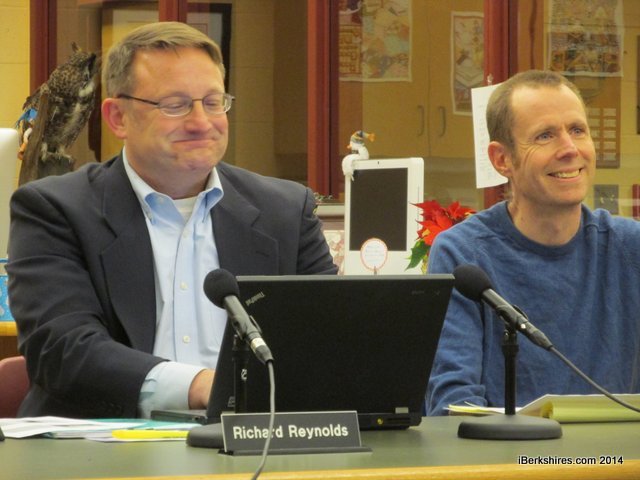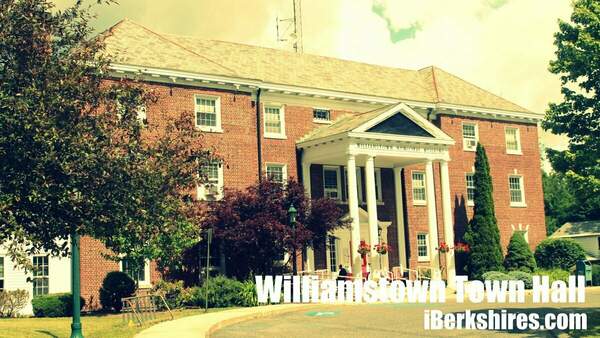Williamstown Elementary Committee Looks at Building Improvements
 Williamstown Elementary Superintendent Rose Ellis and WES Committee Chairwoman Valerie Hall. Williamstown Elementary Superintendent Rose Ellis and WES Committee Chairwoman Valerie Hall. |
WILLIAMSTOWN, Mass. — The town's elementary school is only 12 years old, about the same age as its oldest students and far younger than the aging middle-junior high school where many of those sixth-graders will head next fall.
But keeping the building in good shape costs money.
The Williamstown Elementary School Committee on Wednesday discussed how much money it might want to spend in the next couple of years to make the building more efficient and keep it that way.
Superintendent Rose Ellis gave the committee a report from the Building Renewal Committee comprising representatives of the school and town.
The Renewal Committee is recommending two big-ticket items that Ellis suggested the district may be able to fund out of its operating budget.
The more expensive project is the installation of variable speed drives on the building's energy return ventilators to reduce airflow. The upgrade has an estimated cost of a little more than $82,000 but has an estimated payback timeline of just more than three years.
The other project involves upgrades to the school's hot water heater at a cost of about $16,000.
"Item No. 1 is the most expensive but it will have the biggest impact," Ellis told the committee. "It will save us 110 kilowatts and has a three-year payback period.
"They also tied in to some problems with our domestic hot water. It's not working well with our boiler and heating system. ... It is a significant energy drain on our building.
"This audit was very thorough."
There are other items on the Renewal Committee's list that already are being addressed by the town, Ellis reported. Williamstown is making modifications to several of its properties with funds from a Massachusetts Green Communities Grant.
The school has access to a building endowment established by Williams College that has nearly $300,000 in available funds, but Ellis told the committee she prefers to keep that in case of unforeseen emergencies.
The school has a $20,000 line item in its fiscal 2014 budget for improving the building, she said.
"So many schools are in the condition they are — and Mount Greylock [Regional School] is a good example — because of deferred maintenance," she said.
In addition to the $20,000 for maintenance, Ellis said the school budget has another $5,000 line item for equipment it does not plan to use, and she recommended the committee consider splitting the $98,000 cost of the two priority projects over multiple budgets to pay for the improvements without touching the endowment.
"Eighty-two thousand dollars is a lot of money," committee Chairwoman Valerie Hall said, in reference to the energy return ventilators.
"It is, granted, but we have two budget years, which gives us a lot more latitude," Ellis said, noting the project could not begin until the spring. "Between now and February, [Business Manager Lynn Bassett] and I will be looking deeply into the budget."
Bassett attended Wednesday's meeting to brief the committee on the timeline for the fiscal 2015 budget, which will be crafted between now and Town Meeting on May 20.
Bassett said she is yet to hear much from Boston about how state funding will impact the local spending plan for next year.
"It's' been relatively quiet," she said. "The main thing I've heard is the first governor's budget is due out at the end of January. I haven't heard any talk about what transportation reimbursement might look like, what circuit breaker reimbursement might look like. Right now, we're figuring state and federal grants to be the same [as fiscal 2014]. If we hear of any cuts, we'll have to make decisions."
 School Committee members Richard Reynolds and Dan Caplinger. School Committee members Richard Reynolds and Dan Caplinger. |
Bassett and Ellis already have met with principals of the three schools in the Tri-District (Williamstown, Lanesborough Elementary and Mount Greylock), and they will continue meeting with department heads to determine budget needs in the weeks ahead.
The School Committee will get a preliminary budget next month and a proposed budget in March, when it will hold a public hearing and also make a presentation to the town's Finance Committee. In April, the School Committee will vote on a budget to send to town meeting.
In other business Wednesday night, the committee heard a report from Technology Director Tom Welch about technology initiatives in the school, and Ellis announced the winners of the school's 2014 Renzi Award, named in honor of former teacher, principal and superintendent Helen Renzi.
The awards for citizenship are given each year to as many as four sixth-graders. This year's winners are Maddy Art, Owen Crowell, Molly Shine and Finn Welch, the son of Principal Joelle Brookner and Tom Welch.
"The award recognizes students responsible in their behaviors, who work well with their peers, who are liked by their peers and who are full of heart," Ellis said. "We expect our students to excel academically and artistically, but we also want to talk about the relationship building that's so critical."
Tags: maintenance, school budget, WES,
 Williamstown Elementary Superintendent Rose Ellis and WES Committee Chairwoman Valerie Hall.
Williamstown Elementary Superintendent Rose Ellis and WES Committee Chairwoman Valerie Hall. School Committee members Richard Reynolds and Dan Caplinger.
School Committee members Richard Reynolds and Dan Caplinger.














